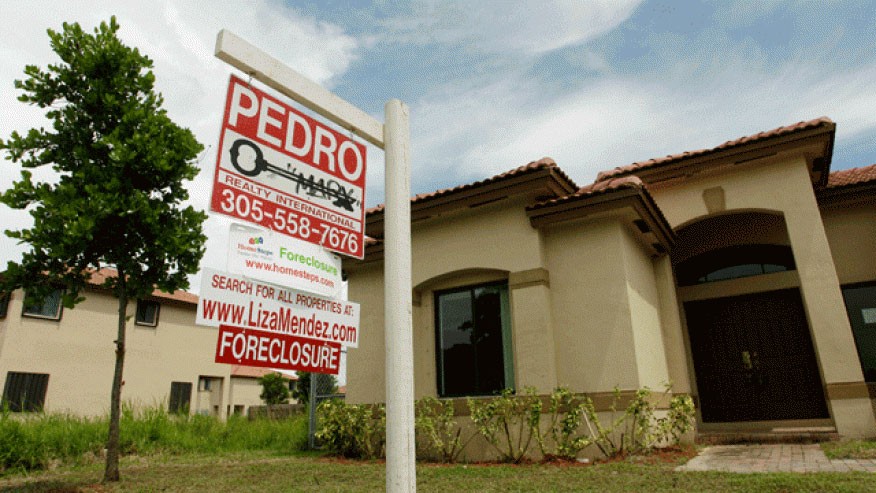Tips on Buying Foreclosed Properties
Post on: 1 Май, 2015 No Comment

As banks begin to process their housing backlog, experts are expecting a wave of foreclosures to rock the already shaky real-estate market this year. Coupled with low interest rates, this could be a great opportunity for homebuyers to pick up a home or investment property at a bargain.
According to RealtyTrac, 31% of sales nationwide are of homes in pre-foreclosure or already bank owned—giving buyers many purchasing options if they do their homework. In 2011, real estate prices were flat, with the average price of a single-family home $169,500 in the third quarter, and $167,600 for condos and co-ops—up to a 20% discount from 2008 prices, with quarterly sales at 4.88 million, according to the National Association of Realtors .
Each state has a different timeline for the foreclosure process, and buyers have opportunities to purchase a pre-foreclosure or foreclosed (real estate owned (REO) or bank-owned) home during different parts of the process.
Prior to foreclosure, some homeowners choose to do a “short sale,” which is when the lender agrees to accept a payoff of less than the balance due on the loan.
“Homeowners have to advertise the sale as a short sale,” says Will Farley, a real estate agent at Long and Foster. “If a buyer writes a contract, that contract is contingent on the bank accepting less than what they’re owed.”
And don’t let the name fool you: “The short sale process can take three to six months because banks are overwhelmed,” says Farley.
Since the time between bid and sale is lengthy, Alexis McGee, co-founder and president at ForeclosureS.com, advises buyers to protect themselves against downside risk from home prices that could decline during this period. “Make sure that your offer price would reflect changes in the market,” she says.
Buying at Auction
When the homeowner voluntarily gives their keys to the bank in exchange for cancelling the mortgage, banks take possession of homes by a deed in lieu of the foreclosure process.
When a bank takes a property from a homeowner involuntarily, the home can be sold at a public auction 90 days later, says Erin O’Connor, real estate agent with RE/MAX Excalibur. Bidders can’t view these houses prior to the auction. “You go to the property before the auction and, if it’s vacant, look through windows,” he says. “Buyers won’t know if there’s no air conditioning, cut electrical wires or other vindictive damage that the homeowner did out the door until after the sale.”
The winning bidder is usually required to put down a $10,000 deposit toward the purchase price and has one day to inspect the inside of the house and decide whether to complete the purchase or forfeit the deposit. A buyer needs enough cash to fund the entire purchase in one day and to rehabilitate the house after close, according to O’Connor.
“Purchasing from an auction is the last avenue a buyer should use unless they have a very seasoned, experienced auction purchasing agent,” says O’Connor.
If the property doesn’t sell at a public auction, the bank takes ownership of the home with the intent of reselling it on the market, according to RealtyTrac. “Once a property is bank owned, it’s a standard timeframe purchase,” says O’Connor. “Bids are accepted or rejected within a few days, and the closing occurs in about 30 days.”
Know Your Market
A foreclosed property may be a great bargain, but a buyer has to do their homework before making an offer on a foreclosed property.
When looking for a home in a particular market, Daren Blomquist, vice president at RealtyTrac, advises buyers to research sales prices, the number of foreclosures in the area, school districts, and amenities such as restaurants, shops, and the proximity to landmarks like a beach or mountains, all of which impact home values.
Every market has some portion of bank-owned homes for sale. “You want to be careful if every house is in foreclosure,” Blomquist says. “When you purchase a property in this market, the value will probably go down before it goes up. If it’s the only property in a market, you can probably get a good deal.”
McGee advises borrowers to buy properties in good shape that are located in good neighborhoods. When negotiating, expect to negotiate a maximum 10% to 20% discount when buying a bank-owned property, she says.
Set Realistic Expectations
Before the house-hunting process, homeowners should know how much they can afford by prequalifying for a mortgage. “Make sure you can get a loan,” says McGee. “It gives you the power to negotiate.”
The Department of Housing and Urban Development provides foreclosed-home buyers with options outside of a traditional mortgage. “The Federal Housing Administration Section 203(k) program is great for foreclosed home buyers,” says Blomquist.
Section 203(k) loans are funded by private lenders and insured by HUD, with borrowers able to use a portion of the loan to rehabilitate an owner-occupied house. The down payments for these loans are 3.5% of the purchase price instead of the traditional 20% down payment for a mortgage without insurance. When a house requires rehabilitation, buyers can borrow up to an additional 10% of the house value, as determined by appraisals and estimates, to fund construction costs, according to HUD guidelines.
Qualifying for an FHA loan can be a complicated process, particularly when a portion of the proceeds will be used for construction costs. “You need contractors to bid on the house, and these bids are given to the appraiser who provides a value of the house before and after it’s rehabilitated,” says Farley.
“You can get a great bargain but it needs more repair, and the FHA loans give you more money to help fix up the property,” Blomquist says.
Decide how What Repairs You Can Handle

Knowing what’s yet to be listed can give you a leg up in competitive markets.
“Foreclosures aren’t always listed for sale right away,” Blomquist says. He advises buyers to first start looking at those listed on the market before contacting a bank for their REO properties that are not yet listed. There may be less competition for these unlisted properties, he adds.
Due to low inventory in some markets and low interest rates, some properties have received multiple offers, very few of which exceed the asking price, according to O’Connor.
Do a Full Inspection and Title Search
“Short sales aside, buying a bank-owned home and a home owned by a regular seller is not that different,” Farley says. “The difference lies in the inspections because banks aren’t in the business of fixing things.”
Experts advise that buyers of foreclosed properties ask for a home inspection. “Getting a home inspection is not a requirement, but you can make it a requirement by including an inspection contingency clause in your offer agreement,” says Marvin Goldstein, president of the American Society of Home Inspectors. “No one wants surprises on the last day.”
A lender only requires a termite inspection to check for physical damage from termites and a flood certification that determines whether the buyer needs federal flood insurance when the house is in a floodplain, but these are different than a home inspection, says Goldstein.
When a vacant home’s utilities are turned off, experts recommend asking that utilities be turned back on for the day of the home inspection so that inspectors can functionally test the heating, cooling and plumbing. “Every day that a home is vacant and utilities are turned off, the systems of the house begin to degrade,” Goldstein says. “You can’t determine this until everything is turned back on.”
You can ask whether your home inspector provides cost estimates for any repairs. Experts advise using the house’s condition as leverage during negotiations, but to be weary of a house in need of expensive repairs that, when the estimated costs are added to the mortgage balance and down payment, the total is more than the appraisal value for the house after its repaired.
In addition to a home inspection, a title search on the property will determine whether the property has other liens by lenders that haven’t foreclosed or if property tax is owed, says Blomquist.
When there’s a problem with the title search, title insurance will help you get reimbursed. “If you don’t have title insurance, don’t buy the house,” says McGee.
Since buying a home in this market may have extra complications, Blomquist advises buyers to be patient. “In this market with increased foreclosures, buyers will still have the upper hand,” he says. “You can afford to be patient and wait for a property and opportunity that’s best for you and not settle for something just to buy quickly.
+ Follow Fox Business on Facebook














